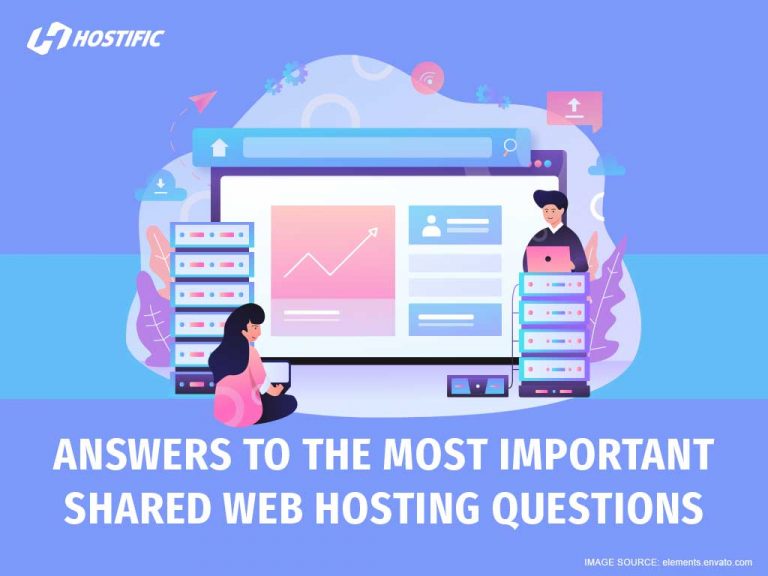We get it.
When you’re trying to figure out the best hosting options for your website, there’s so much new information being thrown at you that sometimes, you probably feel like giving up on making a website altogether, and just training a carrier pigeon instead. Good news: We love web hosting, and we think everybody has the right to make intelligent decisions about their own website. So we’re answering some of your most frequently asked questions about premium web hosting.
Table of Contents
Answers to the 7 most important premium hosting questions
- What is premium web hosting?
- What’s the difference between web hosting and domain registration?
- What is cPanel?
- What is shared hosting?
- Who is shared hosting best suited for?
- Is there anything you need to watch out for, if you choose shared hosting?
- What are the benefits of shared hosting?
Let’s get into it.
1. What is premium web hosting?
If you create a website that you want people to find, you have to store it somewhere. The place where your website is stored is called a web server.
A web server can mean either hardware, software or both. It’s the physical specialised computer that stores all the files that make up your website (images, text, video and other data), as well as the software that controls how internet users access your website.
“A web hosting service operates web servers and “rents out” space on the servers where users can store their websites.”
Technically, you can just operate your own server, but web hosting services cost way less.
Web hosting is a smart choice for you if you need a website, but don’t have the absolute buckets of money you’d need to buy and maintain servers.
Premium web hosting companies will also give you access to 24/7 customer support. This means you’re not on your own if something happens to go wrong.
2. What’s the difference between web hosting and domain registration?
If you sometimes get these terms confused, you’re not alone.
Let’s break them down.
You already know what web hosting is: It’s a service that rents a server to you, so you have somewhere to store your website.
A domain name is the website address that people type into the search bar when they want to find your site. When a website is hosted on a server, it has an address that’s a string of numbers with some dots in between. This is called an Internet Protocol (IP) address, and it might look something like this: 123.111.6.7.
That’s fine if you’re a computer, but really confusing to a human.
So, instead of having everybody remember your IP address, you rent a domain name that looks more like this: www.easier-to-remember.com.
So, you can think of the difference between web hosting and domain registration like this: When you get web hosting, you’re getting a place to put your website. When you get domain registration, you’re making it easier for people to find your website.
Premium web hosting companies will usually often offer web hosting and domain registration.
3. What is cPanel for?
cPanel (control panel) is a web-based interface that lets you manage your website and your web hosting account. It uses lots of icons and automation tools, so it’s user friendly, even if you know absolutely nothing about technology.
If you have lots of creative ideas for things you want your website to do, it’s really important that you look for a hosting company that offers web hosting with cPanel access.
Choosing web hosting with cPanel access means you can manage your website databases, domains, sub-domains, and everything else that keeps your website running like a well-oiled machine.
You get lots of technical support when you choose web hosting. With cPanel access, you also get lots of control over your website.
4. What is shared hosting?
Shared hosting (also called shared web hosting) is a service in which the same server hosts different websites at the same time.
Each website is stored in a separate place on the server, so you don’t have to worry about someone typing in your website and accidentally getting another website. However, all the server’s resources are shared by the sites stored on it.
This way of hosting your website is usually cheaper than having a dedicated server. In fact, it’s a great way to lower your web hosting costs.
Shared hosting could save you quite a bit of money, since even if you choose a dedicated server, premium web hosting costs a lot less than you think.
5. Who is shared hosting best suited for?
Shared hosting might be a good option for you if you have a small-to-medium-sized business website that doesn’t get tons of traffic, because your website might not need a dedicated server just yet. When you scale up your business, though, you might want to look into hosting options that are a bit more capable of handling your increased traffic.
If you’re getting web hosting for the very first time, shared hosting might also be great for you. It’s a good way to dip your toes in without committing to a VPS (virtual private server) or dedicated server.
6. Is there anything you need to watch out for, if you choose shared hosting?
Right now, your website might work just fine with a shared server, but you never know when you might get lucky and have a sudden spike in traffic.
When this happens, your server might be unable to handle it, and your website might crash.
Also, because you’re sharing the server with someone else, you are kind of depending on them not to abuse the server’s resources. If they’re not very considerate, or if their website has a sudden spike in traffic, your website might slow down.
Even without a traffic spike, your server just isn’t going to be as fast as it would be if you had a VPS or dedicated server that handled only your website.
7. What are the benefits of shared hosting?
Shared hosting is primarily about cost sharing. It’s much cheaper than a lot of other hosting options, and because the host handles all the complex, technical aspects of keeping your website in operation, you don’t have to worry about things like server maintenance.
Shared hosting is an easy, low-commitment way to get used to web hosting. And when your business grows and your site traffic increases, it’s easy to switch to a hosting package that’s better suited to your needs.
If you choose shared hosting with cPanel access, it’ll be easier to manage your website, and far less than the cost of VPS and dedicated hosting.
Wrap-up
Shared hosting is a great, cost-effective way to try out web hosting if you have a small-to-medium-sized site that isn’t constantly overrun with traffic. Look for a hosting company that gives you lots of premium web hosting options, so you can scale up your website when you need to.
Have any more questions about web hosting? Check out our other blog posts.
If you want to know something a bit more technical, we offer 24/7 support from web hosting experts.






